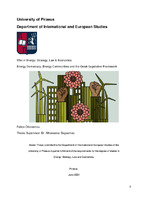Energy democracy, energy communities and the Greek legislative framework

Master Thesis
Συγγραφέας
Oikonomou, Fotios
Οικονόμου, Φώτιος
Ημερομηνία
2021-06-10Επιβλέπων
Dagoumas, AthanasiosΔαγούμας, Αθανάσιος
Προβολή/
Λέξεις κλειδιά
Energy democracy ; Energy communitiesΠερίληψη
The transition from conventional energy sources, such as coal and diesel, to renewable energy
sources is essential in the midst of a global climate crisis. A vital step towards this direction is the
adoption by the United Nations of the 2030 Agenda for Sustainable Development, which consists 17
Sustainable Development Goals (SDGs) aimed at safeguarding the sustainability of Earth and humanity
while promoting democracy and green growth for all. The electricity market is constantly evolving and
this evolution should enable citizens to generate and consume their own energy. The only way to
achieve that during the energy transition is to establish energy democracy and set up energy
communities.
Energy democracy is a relatively new concept for which there is no precise definition yet, as it started
being referred to in academic articles since 2010. Energy democracy is a notion that ensures access for
everyone to adequate energy, elimination of energy poverty, generation of energy in ways that do not
harm or pollute the environment, as well as regulation of production, distribution and consumption of
energy in a collective, political and public form. The issue of energy poverty, which has also emerged
relatively recently, is featured in studies presenting a wide variety in energy poverty rates between
European Union countries even today. At the same time, while in the Western World access to modern
energy services can reach 100% even in rural areas, developing countries, such as those in Sub-
Saharan Africa, face serious energy deficits in remote and rural areas. A suitable solution for this issue is
the establishment of autonomous renewable energy systems, which will reduce the connection cost to
the main power network.
Energy communities are an institution that empowers its members to produce the amount of energy they
need to consume (prosumers), upgrade the community’s status, actively contribute to the energy
transition process instead of being plain observers, fend off energy poverty and lack of access to modern
energy services, and promote energy democracy and gender equality. The cited references to energy
communities from around the world showcase how they operate, as well as their role in local
communities and the energy transition process.
The purpose of this dissertation is to present and thoroughly examine the institutional framework in
Greece regarding the establishment of energy communities and whether it follows the European Union’s
proposals for encouraging the participation of citizens in the energy market and the energy transition
process, in order to achieve the energy and climate goals set by European institutions. The multitude of
bureaucratic and financial obstacles that hinder the development of energy communities in Greece, as
well as the issue of gender inequality within the communities are also prominently featured. In
conclusion, proposals and solutions regarding the orderly operation and development of energy
communities in Greece are presented, as well as the need for advocating in favor of laying the
foundations of energy democracy. This institution will propel communities to achieve social equality and
justice as well as a transition to a viable world, where citizens will produce and distribute clean
renewable energy.


